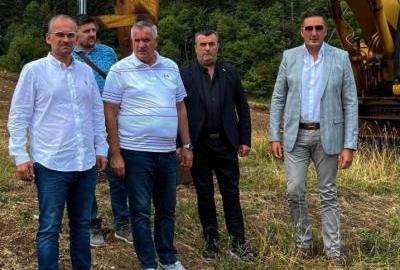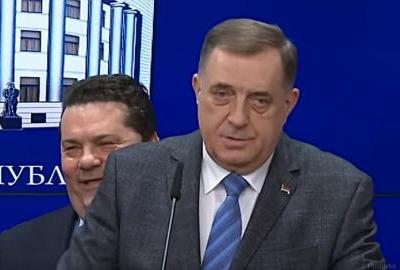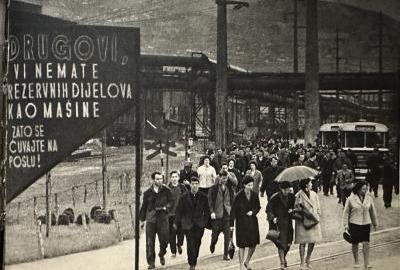Žurnal in English
THE PRESIDENT'S PLUM ORCHARD: How Milorad Dodik imagines freedom and the state
This is Dodik's idea of the state - a feudal estate, where the party's infrastructure serves to collect tribute from which narrow family circles take the largest part. As for freedom, he means by that term blind loyalty to the master, gratitude for the merest wages.

Milorad Dodik recently, just like that and on a whim, rejected the agreement of the German ambassador. This disturbed the diplomatic world, because similar scandals only happen in the days of the greatest crises when relations between countries are so damaged that their representatives are no longer welcome in those territories. Such incidents are usually preceded by a series of meetings and attempts to establish a civilized dialogue. In Dodik's case, that was not the case, he did it without any announcement or visible reason, because he wanted to and because he could.
Unreasonably and recklessly humiliating a great country by trying to prevent what it cannot prevent is unprecedented diplomatic stupidity and irrational insolence that could and must cost him a deservedly high price - diplomat Slobodan Šoja commented on Dodik's move.
JESTER IN THE CASTLE
It is not the first time that Dodik has played with major world powers, humiliated experienced diplomats and ridiculed established international protocols. It could also be endearing, because it resembles comic patterns in which some jester comes to the court and jokes with the stiff-necked courtiers. But his kabaddi bravado is not funny at all, mainly because we suffer the consequences. Because, for now, no threats or pronounced sanctions affect Dodik.
At a recent meeting in Stričići, he said that he will run again, regardless of the fact that, as he claims, Western countries are constantly contesting this.
"They are trying to prevent this by sanctioning, contesting, subterfuge, and sometimes bombing with depleted uranium. Of course, they won't be able to do that..."
Milorad Dodik seems to have learned communication skills in the midst of war, through smuggling negotiations at border gas stations, where the unscrupulous and stronger win, and all decisions are made quickly, based on instinct. It seems that this doctrine decisively determined his worldview because he believes only in raw power.
STREET LIGHTS
He has built his entire career so far avoiding the laws and moving in the grey zone of the economy. That is why he is not at all interested in joining the European Union, the laws, economic measures and customs regulations there would stifle him like a starched collar. He needs something like that the least, it would completely threaten his private fief, in which he has created his own circles of power, where the strongest is the inner, family ring, strengthened by the best man and debt ties.
After his last visit to Brussels (when he made a racist comment that representatives of the RS arrived by plane, while the rest like a group of gipsies), he demonstrated how he evaluates international relations. He went to Brussels to, with the help of international representatives, establish a dialogue for the exit of Bosnia and Herzegovina from the decade-long crisis. He came back with only one remark. He noticed that the street lights around the hotel where he was staying were not working, which he immediately interpreted as the downfall of that economy and happily announced this at the first press conference upon his return. He didn't see or hear anything else, and the little he did, he interpreted as he saw fit.
FREEDOM AND THE STATE
At the same rally in Mahnjača, he declared that he would run again to offer the people the idea of freedom and a state. He received solid applause for that statement, although he did not explain his idea more precisely.
He did this a little earlier, at the summit in Saint Petersburg. In his opinion, the free will of the individual is to blame for all crises in the world. Because of this, he further developed the theory, that only strong leaders - the presidents of Russia, China and Turkey - can save the planet.
These are politicians who either despise individual freedoms or have a very selective view of human rights. Some of these presidents look very favourably on the eradication of minorities and the punishment of human rights activists, in some of Dodik's favourite regimes, verbal offences lead to prisons, the judiciary is under the decisive influence of the government, and some of them portray obvious, brutal aggression as a fight against fascism. It is a chilling speech, but in St. Petersburg, he received applause, among others, from the Taliban delegation.
PLUM ORCHARD AS A COUNTRY
Another detail well illustrates what the country that Dodik offers in his pre-election speeches looks like. Recently, a Viber message from an SNSD activist from Latakia appeared in public, in which party members are invited to pick plums in Dodik's orchard. Those interested are provided with transportation and food, and they will be paid ten pfennigs per kilogram of fruit harvested. If that is not attractive enough, the activist says that after the working day, socializing with the president will also be organized.
It's strange news, somehow it sounded exaggerated to me that party members are being recruited to harvest fruit, that they voluntarily agree to be serfs earning a living on the master's property, so I even suspected that it was fake. But very soon its truth was confirmed by a well-informed person - Dodik's daughter Gorica, a restaurateur and Twitter activist. Nothing in that news is strange to her, she hastened to react to the miserable wage of ten pfennigs. She says that "workers" (it's interesting that she calls members of the SNSD workers, apparently she learned from her father that they are one and the same) on the family farm pick as many as 750 kilograms of plums per day, so she invites economic analysts to calculate how much each of them can earn at the end of the day.
WE ARE STRONGER THAN FATE
So it's all true. Small workers from the party will gather in the president's orchard, he will give them ten pfennigs for every kilogram harvested, and at the end of the day they will all sing together "no one can do anything to us, we are stronger than fate". The plums will then go to the distilleries of the Dodik family, and under the brand name "Djedova rakija" will be distributed to restaurants that are also owned by the family. Better-off members of the party will come to those restaurants and will hang out there and sing "no one can do anything to us, we are stronger than fate" at the end of the party. Everything remains within the circle of the party - petty serfs hump with the hope that they will thus earn the lord's favour and advance in the party hierarchy, at least to the point where they can join the company from the restaurant, while the middle-level officials drink the master's brandy and hope that he will give them some kind of a small "orchard" to be managed on behalf of the lord. The accordionist plays the same song all the time, and the money stays where it is already used to being - in the pockets of the Dodik family.
This is Dodik's idea of the state - a feudal estate, where the party's infrastructure serves to collect tribute, from which narrow family circles take the largest part. As for freedom, he means by that term blind loyalty to the master, gratitude for the merest wages.
World diplomats have to deal with such manorial structures. Now it is meaningless to refer to diplomatic protocols and civilized conversations, society is too riotous to pay attention to house rules. There is no longer any geostrategy, there is only fear of the stronger and contempt for the weaker. Diplomatic scandals are not an incident but logical consequences.
(zurnal.info)








